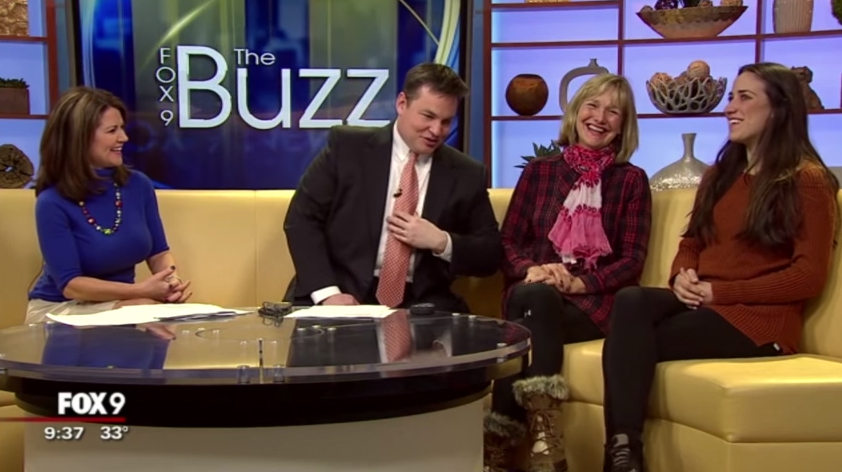Chris HewittPioneer Press
February 17, 2016
One hallmark of music director Denise Prosek’s work is that, despite her title, she is not at all precious about the music in a show.
“I will cut music. I will edit music. I will change keys to make a song work. For me, the music is all in service to the story we’re trying to tell and, if it’s not, then why is it there?” says Prosek, music director for Theater Latte Da, which opens a new production of “Gypsy” on Saturday. “If somebody is on stage singing and it doesn’t advance the story, then what’s the point? I’m a big believer in that.”
It’s a point of view Prosek, 47, has been honing since she and Latte Da artistic director (and “Gypsy” director) Peter Rothstein were doing musical theater together at Grand Rapids Senior High School. She was two years behind Rothstein in school and, she claims, further behind when it came to acting talent.
“I was a terrible actor. I think in all of the shows I was in over the years, I had a total of one line. I just didn’t understand about enacting a character — or, I understood it from the outside but I didn’t understand how to get in and embody a character,” says Prosek, who felt like her insecurities were confirmed when her high school’s theater director took her aside at an audition and said, “Denise, let’s try you on the piano for this show.”
In a way, Prosek had already been behind that piano for years — she started playing when she was 4 — and she’s still there, determining how the music should work for dozens of productions throughout the Twin Cities, whether it’s directing the music for Mu Performing Arts’ “Into the Woods” or arranging the orchestrations for Park Square Theatre’s “The Color Purple.”
Most recently, it led to Latte Da’s triumphant “Sweeney Todd,” a show that combined trained musicians with lead actors who were a little out of their comfort zones when it came to singing.
“Sally Wingert and Mark Benninghofen would be the first to tell you they’re not known as singers,” Prosek notes. (The actual comment from Wingert, who also did Latte Da’s “Cabaret,” is, “I have no business being in a musical. None. But I could go on and on about how Denise supported me both times I did musicals with Latte Da.”)
On the one hand, Prosek says the younger performers in “Sweeney Todd” — which will be revived, with the same cast, in March 2017 — were awed to be working with stage vets Wingert and Benninghofen. On the other hand, Wingert and Benninghofen were tackling huge jobs.
“It was about working with them to make sure they knew the language of what we were all talking about when we’d say ‘measure 45, beat 19’ or whatever. They were vulnerable, coming into this situation where they were surrounded by people who do read music and have studied it, so you want them to not worry about being embarrassed or trying things,” says Prosek, who often negotiates similar issues as a music director.
It’s a career Prosek, who attended St. Olaf College with the plan to be an accompanist, says only happened because the universe made it happen.
“I was working at Schmitt Music (in Minneapolis) one day when (legendary Twin Cities music director) Anita Ruth came in. We were chit-chatting and she said, ‘You should take one of my classes,’ so I did, and then (Chanhassen Dinner Theatres music director) Alan Shorter was in one day, too, and we were talking and I ended up working with him out at Chanhassen,” recalls Prosek, who had been prevented from her plan to attend grad school by a broken arm and had come to the Twin Cities in search of opportunity.
She quickly learned the job of a music director, which she describes as “hiring musicians, making sure the notes are right, trying to keep people happy. Also, the thing I’ve learned is really important is paying attention to the dramatic element, the idea that the actors should feel supported and comfortable or else the audience will feel their discomfort in the performances.”
After assisting others, Prosek’s first gig as a music director was in Garrison, Iowa, at a creamery that had been converted into a theater. The show was “Nunsense 2” and it was a major learning experience.
“I made a lot of mistakes, in terms of understanding boundaries and communicating,” Prosek says. “I remember, when I drove in I thought I was in the wrong place but then I saw a sign that said, ‘Garrison, population 350,’ that someone had crossed off and written ‘351,’ so I thought, ‘Am I supposed to cross that out and write ‘352’ now that I’m here?’ ”
Prosek reconnected with her high school collaborator Rothstein in 1994, when the performing apprentices at Children’s Theatre Company asked the pair to help them assemble a production of the revue “And the World Goes Round,” to showcase their performing skills. It was such a hit that they ended up re-staging it at Bryant Lake Bowl, then creating several other revues, then deciding to start Theater Latte Da in 1998.
Oh, and about that name …
“Peter and I have different versions of this and I don’t remember his but mine is that he came to my door one day — and this is so him, where, if he has an idea, he immediately goes to other people and says, ‘What do you think about this idea?’ — so he came and he suggested the name, ‘Latte Da,’ ” recalls Prosek. “I liked it a lot at the time. I still like it a lot. And, in those days, our audience was really uptown and hip and younger and, obviously, drank a lot of lattes, so it seemed like a good fit.”
So did the pairing of Rothstein and Prosek, although Prosek notes that the collaboration that has extended over more than three decades is not without the occasional bump.
“I always joke that it’s like a marriage. My husband and I don’t fight much, but Peter and I bicker and make up all the time,” says Prosek, who lives in Crystal with finance director Milton Ferris and their two kids.
These days, Prosek and Rothstein have been bickering and making up over “Gypsy.” It’s Latte Da’s second production of the show but it’s an all-new take that is inspired by the idea that the classic Jule Styne/Stephen Sondheim musical — in which stage mom Rose bullies daughters Louise and June into the show biz career that eluded her — takes place during the years when vaudeville was dying.
“It’s a show about the last days of vaudeville, in a way, and we’re doing it at the Pantages Theatre, which used to be an old vaudeville house. How cool is that?” Prosek asks. “When audiences walk in, they’ll see that the designers have piled junk on the stage, so there’s already this idea of the decay of vaudeville, right off the bat.”
Adding extra interest to the production is that central characters “Mama” Rose and daughter Louise are played by real-life mother and daughter Michelle Barber and Cat Brindisi, who also played mother and daughter in Latte Da’s “Spring Awakening.”
Once “Gypsy” is up and running, Prosek will already be involved in several other projects, none of which would have happened, she thinks, if not for events like that gentle nudge toward the piano and that fortuitous meeting with Anita Ruth at Schmitt Music.
“Anita Ruth forged the way for so many women in the Twin Cities, getting them involved and saying, ‘Hey, this is OK for you to do this.’ I can’t think of anyone else who has done anything like that around here,” Prosek says.
Which is maybe why, as Prosek’s answers to our nine questions reveal, she’s intent on paying it forward:
Q. What would you do if you had a million dollars?
A. Start a foundation for women musical theater directors. It’s not that I think anybody is trying to keep women out. I just think it’s the way you hear about jobs and the way you meet people that sometimes keeps women out — like, in the ’60s, men would meet each other on the golf course or wherever and women simply weren’t there.
Q. Where is your favorite place to be?
A. At home with my family.
Q. What’s the scariest thing you’ve ever done?
A. I have a boring life! My first flight overseas was scary. I hadn’t flown until I was an adult and I was scared to death.
Q. What was your first job?
A. I was a waitress for the Frontier Steak and Shake in Grand Rapids.
Q. What are you thinking about when you’re about to begin a project?
A. I’m not the greatest communicator always. Language eludes me. So I always want to walk in and know I’ll be able to hear what I need to hear but also be able to communicate quickly what I need. I always hope I’m being articulate enough that we can accomplish what we want to accomplish. I get nervous about that.
Q. Who would play you in a movie?
A. Jodie Foster.
Q. What’s the best thing about your job?
A. The people, absolutely.
Q. What’s your motto?
A. It’s not exactly a motto but I guess I try to live and work as intentionally as possible.
Q. Who do you most admire?
A. Meryl Streep. Oh, and Mary-Mitchell Campbell, who’s a music director in New York. The thing I love about Meryl Streep is that it just feels to me that she’s constantly willing to put herself out there, much like Sally Wingert is, saying, “I might not be the best at this but I’m going to do it,” and she succeeds. Mary-Mitchell Campbell is also so driven and wants to do better for the world. She’s one of those people who puts themselves out there and doesn’t worry about judgment, which I admire because I do worry about being judged and I need to let that go. I’m going to work on that for the rest of my life, so I admire people who don’t let that affect their work.
IF YOU GO
What: “Gypsy”
When: Through March 13
Where: Pantages Theatre, 710 Hennepin Ave., Mpls.
Tickets: $56.50-$31.50, 800-859-7469 or hennepintheatretrust.org





